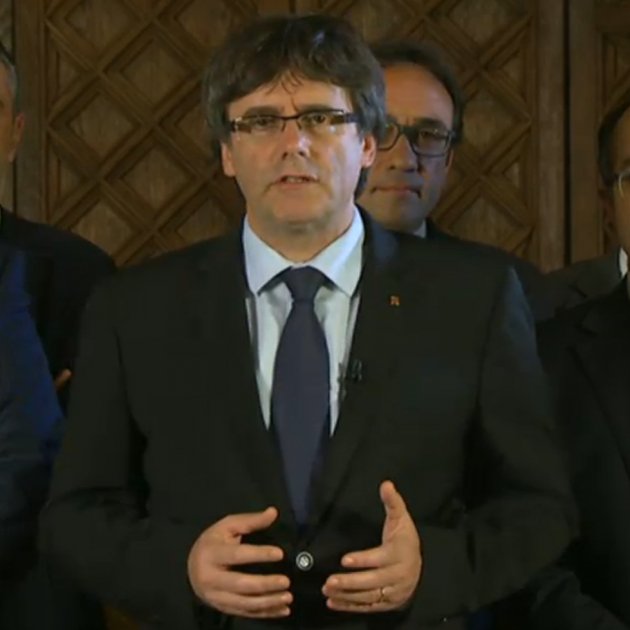The Catalan government has, in recent weeks, opened a number of different political and diplomatic paths looking to realise its proposal that some institution or group with international recognition and prestige play the role of mediator in its conflict with Spain. Currently, El Nacional has learned, they are working on three different options, the most advanced of which would be an involvement from the Catholic church through the archbishop of Barcelona, Joan Josep Omella, and the abbot of the famous monastery of Montserrat, Josep Maria Soler, with the Vatican having explicit knowledge of their management of the issue.
In the last few weeks, both the Catalan president, Carles Puigdemont, and vice-president, Oriol Junqueras, have played important roles in pursuing this option. Junqueras got involved during a dinner held at the Episcopal Palace in Barcelona on 20th September, by coincidence, the same day that Spain's Civil Guard entered a number of Catalan government departments, including the Economy ministry which he is the head of. After that meeting, Omella passed the information to the Secretariat of State of the Holy See. More recently he is supposed to have had a discrete meeting with Puigdemont at the Catalan government palace.
The Catalan government, which logically has a great interest in opening mediation, as there are many voices asking for it, from EU heads of state to the editorials of some of the most influential newspapers in the world, is playing this card aware of the enormous difficulties it entails. Not on their part, clearly, but for the most absolute stubbornness of the Spanish government and, since Tuesday evening, king Felipe VI, who revealed his official position during a message broadcast on television in terms of rare harshness. Nonetheless, it's a card they want to play so that their position is clear in the eyes of public opinion.
The Pope, informed
The latest conversation about the question apparently took place this Wednesday between Omella and Junqueras. As for the role of the abbot of Montserrat, much less is known. The Benedictine monk commented in May that pope Francis is "perfectly up-to-date with what's happening in Catalonia" and that "the Vatican normally recognises all the new states that are created and, as such, I believe that it will recognise Catalonia", but has said little since. In his homily on 24th September, during the midday mass at Montserrat, the monk Sergi d'Assís denounced the Spanish government's repression aimed at stopping the referendum, something that seriously bothered Madrid.
Later, on 27th September, the permanent commission of the Spanish Episcopal Conference released a note calling for dialogue between the two governments. For the second time in just days, the Spanish government felt the Spanish church's position was excessively neutral. This Tuesday, Omella, accompanied by the archbishop of Madrid, Carlos Osoro, met Spanish prime minister Mariano Rajoy in his official residence, the Moncloa palace, who asked them for help with the Catalan issue. Explicitly excluded from the meeting was the president of the Spanish Episcopal Conference, Ricardo Blázquez, who Rajoy considers responsible for the neutrality of the Spanish church and the call for dialogue between the parties, a very different position to his predecessor Rouco Varela. Within this context, the archbishop of Barcelona is also reported to have held meetings with other important figures from the history of Spanish politics.
Prodi, Cameron, Blair
The range of options contemplated by the Catalan government isn't limited to the Catholic church. Instead, two international figures have been sounded out on the matter, El Nacional has learned. First was the former Italian prime minister (1996-1998) and president of the European Commission (1999-2004), Romano Prodi, who is well aware of the reality in Catalonia. On 17th September, he signed a manifesto calling for dialogue between the governments and expressing worry for the situation in Catalonia. Some months earlier, Prodi had met in Bologna with Puigdemont and the Catalan Foreign Minister, Raül Romeva. In the letter Prodi signed alongside politicians like Piero Fassino (former Italian minister, former mayor of Turin) and Bobo Craxi (socialist, son of the controversial Betino Craxi) there was a clear call for a return to dialogue.
The other serious option on the table for the Catalan government is the former British prime minister David Cameron, who negotiated the 2014 Scottish independence referendum with then-first minister Alex Salmond. Cameron resigned the UK premiership in July 2016 after his spectacular loss in the Brexit referendum the previous month. Nonetheless, Cameron, a conservative politician, had saved the unity of the UK in the Scottish referendum. He has always publicly maintained, to justify why he accepted holding a referendum on Scottish independence, that it's difficult to ignore the demands of a population when there's a request for independence in the middle. A posture that's sufficient for Catalonia, impossible to share with Madrid. In terms of the British option, the Daily Express has suggested another name: one of Cameron's predecessors, former Labour leader Tony Blair.
